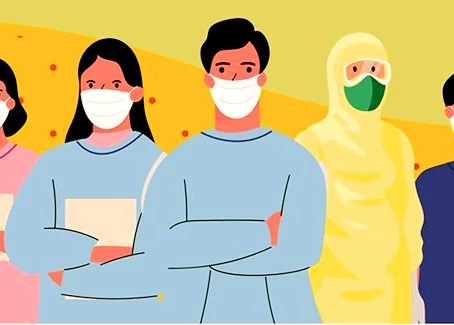
A worldwide COVID-19 widespread has brought about from the rise of the profoundly irresistible novel coronavirus SARS-CoV-2. The worldwide healthcare system has been seriously strained since the outbreak of COVID19. The rapid and explosive rise in positive cases has resulted in a substantial increase in medical aid demand. The role of dentists in volunteer medical assistance and potential preparedness for a similar pandemic is discussed here.
Even though dentists and doctors have different clinical practices, their educations are very similar. As a result, dental professionals are an important resource in the COVID-19 pandemic response, thanks to their knowledge of basic human science and sterile surgical techniques.
Overall, several dentists have risen to the task of combating COVID-19, which is commendable. In Singapore, for example, the National Dental Centre Singapore (NDCS) used dental clinicians and volunteers from research laboratories to scan for suspicious cases, provide consultations, and perform swabbing operations. In the post-COVID-19 period, dentistry will be significantly altered.
There's a more prominent need for refresher courses on new disease administration procedures for practicing dental specialists. Furthermore, dental school curricula should be extended to include pandemic and disaster relief skills. In expansion, community dentistry ought to incorporate volunteer medical benefits as a portion of the program. This volunteerism would have a positive effect on the development of young dentists' careers.
As a result, future generations will value dentists' contributions beyond dental practice in this pandemic situation.
COVID-19 Devastates the World
Researchers are attempting to understand what causes the virus to spread so quickly, as the number of infected cases grows by the day. According to the evidence so far, SARS-CoV-2 can be transmitted by respiratory droplets, touch, and aerosols.
The high level of SARS-CoV-2 shedding in the upper respiratory tract, also among pre-symptomatic patients, is a major factor facilitating COVID-19 transmission. SARS-CoV-2 pharyngeal virus shedding peaks on day 4 of symptoms onset, and it can be 1,000 times higher than SARS-CoV-1 pharyngeal virus shedding.
Patients with positive test results who were asymptomatic at the time of testing have been identified in several cases. Furthermore, the asymptomatic incubation period for infected individuals may range from 1 to 14 days in most cases, but longer incubation periods of up to 24 days have been recorded. As a result, symptom-based screening alone could have missed a large number of COVID-19 positive events, resulting in widespread transmission.
COVID-19's Impact on Healthcare Providers
The worldwide healthcare system has been seriously strained since the flareup of COVID-19. The rapid and explosive rise in positive cases has resulted in a substantial increase in medical aid demand. Hospitals have actively scaled up their ability of basic and critical care beds on the infrastructure front. Global medical manpower resources, on the other hand, are limited. As a result, many hospital-based healthcare staff had to work longer shifts and work overtime. Such stressors have been linked to lower work performance and fatigue-related mistakes, all of which can be dangerous to patients. To respond to this crisis in a multi-sectorial, inclusive, and humanrights-focused manner, UN organisations have requested voluntary assistance from medical professionals in different job capacities to help handle the pandemic.
Are Dentists Prepared to Help Workforce Fighting COVID19?
Although dentists and doctors have different scopes of practice, their educations are very similar. The dental student, like his medical equivalent, must demonstrate mastery of fundamental sciences such as anatomy, physiology, pharmacology, and microbiology. This is important because dentists are required to handle dental problems in medically ill patients competently. Furthermore, dentists must be able to handle medical emergencies that can occur during normal dental practice quickly and efficiently. Many dental professionals may have received basic cardiac life support training as a result of this. As a result, strong clinical medicine training in dentistry increases dentists' eligibility to volunteer for COVID-19 control and spread.
What Role Can the Dental Community Play in the Current Crisis?
Dental practitioners are an invaluable resource in the COVID-19 pandemic response because of their knowledge of basic human science and sterile surgical techniques. COVID-19 diagnostic tests, such as nasopharyngeal and oropharyngeal swabs, can only be administered by licensed dentists. Dentists are well-positioned to perform such procedures correctly and painlessly due to their thorough knowledge of head and neck anatomy.When the oral or nasal mucosa is irritated while swabbing, the patient can sneeze or cough, potentially releasing infected droplets and aerosols into the air. Many makeshift medical screening facilities, unlike negative-pressure rooms, are unable to prevent SARS-CoV-2 from spreading through aerosol. It's possible that open-air healthcare facilities could become contaminated as a result of this. In this context, dental clinics with facilities to monitor the spread of infections by aerosol, such as negative pressure rooms and highvolume excavators, may help to increase COVID-19 screening capability.
In the inpatient environment, dentists may also support their medical colleagues. Patient triage, vital sign control, oxygen and injectables administration, and drug writing are just a few of the responsibilities. Dentists are capable of administering local anesthesia and suturing if emergency procedures are needed. Furthermore, oral surgeons and dentist anesthesiologists are trained in intubation, deep sedation, and general anesthesia.
For many people around the world, the COVID-19 outbreak, as well as strict lockdown practices around the world, has created a stressful environment. It has been shown that stressful conditions lead to poor oral health. As a result, dental practitioners should think about creating online forums to provide information on oral hygiene and oral health maintenance.A certified team of dentists can be made available online to provide effective oral healthcare solutions in an open, affordable, and suitable manner, as well as to alleviate patients' dental concerns during the lockdown time. To encourage good oral health, oral healthcare professionals will volunteer to help people in community housing.

